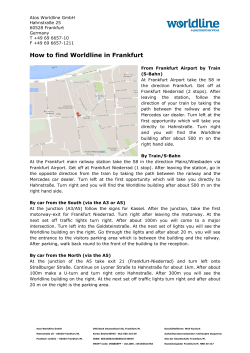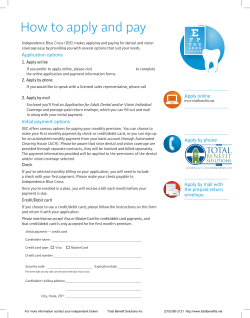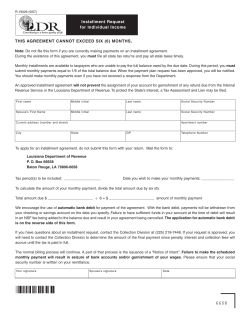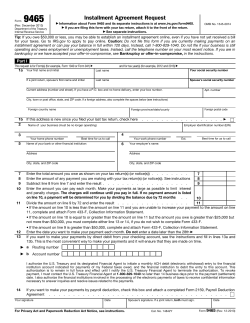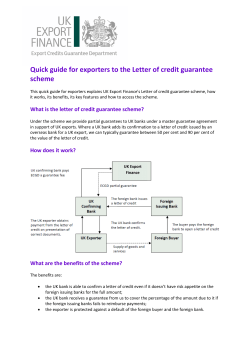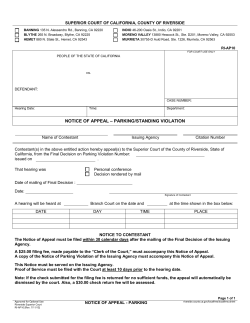
issuers how to leverage EC’s regulation proposal Position Paper
Position Paper issuers how to leverage EC’s regulation proposal on interchange fees for card-based payment transactions The issuing landscape has dramatically changed over the last few years – increased competition, tougher regulation, cross-border offerings, new products, new services for merchants as well as for cardholders and new payment methods. Together, these changes have put pressure on issuing margins. In Worldline, we anticipate that profitability from standard issuing services will continue to decrease. However opportunities for higher margins will arise as a result of new initiatives and new business models within an overall market that is still seeing steady growth. The key drivers for change and innovation include: New technologies Evolution from physical cards towards wallets, tokenization instead of PANs. Cardholder self-service through easy accessible web services, smart phone apps with card profiling, etc. Changing infrastructure through bank enterprise initiatives within the social and commercial eco-systems. Changing customer behaviour Consumers are adopting new payment instruments like mobile payment and new ways of receiving and redeeming e-commerce offers anytime and anywhere. Personalized products and services in specific ecosystems, for card profiling (for example instant card blocking with de-blocking function at the POS), and as well for online banking and account management. Omni-channel with the smart phone acting as central component. New European Regulations and Business Rules The European Commission proposed a legislative package in July 2013 that will have a significant impact, including: 1.A regulation of interchange fees for card-based payment transactions 2.The Payment Service Directive 2 (PSD2) Both documents intend to develop a European wide market for payments, which will enable consumers, retailers and other players to enjoy the full benefits of the European internal market, including e-commerce, in line with Europe 2020 and the Digital Agenda. This Position Paper focuses on the forthcoming European regulation capping the interchange fees and requiring associated business rules, as this will have a significant impact on the structure of card payments in Europe, including card acceptance, profitability and the ability to launch new products. What is at stake for the issuers ? Challenge 1: Interchange fee reduction One of the areas coming under tighter regulation is the capping of interchange fees. At present these fees vary broadly from country to country within the European Economic Area. The European Commission intends to impose a standard interchange fee across all member countries of 0.3% for consumer credit card transactions and 0.2% for debit card transactions (and this is expected to be zero in the future). The proposed capping of both credit and debit card fees will significantly impact issuers all over Europe, where according to PSE Consulting the total revenue loss will be approximately €5 billion p.a., of which €3.2bn will be associated with credit and €1.8bn p.a. with debit. This lower interchange fee revenue for issuers will have a significant impact on existing issuing businesses as well as on investments in new products such as the launching and promoting of new issuing partner programs. Issuers will need to re-assess their existing card program offers and define strategies for both the mass market with basic services as well as the premium market with an additional range of value added services. This may require an appraisal of existing business models with consideration being given to a pay per usage framework for cardholders that access value added services (such as smart shopping solutions) with a small annual fee for the basic account management service. The decrease in interchange fees is one challenge but a significant element of the European Commission’s proposal addresses the implementation of new business rules that will have a strong impact on issuers’ businesses as well as in the evolution of their cardholder programs. Challenge 2: Licensing Licensing refers to a relaxation in the need for a country specific license or authorization. This means that issuers can operate on a cross-border basis. Competition in each European country will become more intense as access for new entrants becomes easier and less costly. Issuers with an international focus need to review their readiness to support cross-border issuing and identify potential gaps in their current operations including: Acquisition of new clients How to manage new and existing relationships How to develop and manage a parameterized issuing platform supporting multiple currencies How to manage multi-language support functions A successful business strategy may depend on either large volumes to ensure scale effects and a decreasing TCO or new revenue streams based on cross selling. Challenge 3: Separation of payment card schemes and processing entities Payment card schemes and processing entities will become independent in terms of legal form, organisation and decision making. This opens the door for third party processors to offer services which have been seen historically as inherent elements of scheme processing, such as authorizations and clearing & settlement switching services. Today, such processing services provided by the schemes are single branded while third party players could support multi branded solutions. There may be technical impacts on the IT systems of issuers arising from the inter-operability standards that will need to be defined. Issuers will need to find the most capable processing suppliers in terms of market coverage, solution quality, service and pricing. Challenge 4: Co-badging and choice of application by the cardholder Article 8 of the proposed regulation allows issuers to issue payment instruments (such as cards or digital wallets) with more than one brand on the same instrument, thereby enabling the consumer to choose which brand they use when paying. The choice of payment brand used remains with the consumer and cannot be prescribed or influenced in advance by the issuer through automatic mechanisms on the instrument or the equipment at the point of sale. Different brands on one card or in one digital wallet could strengthen the need for issuers to differentiate themselves through loyalty programs and increase the penetration of closed loop schemes. Issuers will need to increase their collaboration with retailers (to reinforce co-branding), loyalty partners and the payments schemes. Challenge 5: Limitation of the “Honour All Cards” rule and suppression of the “No steering rule” Article 10 (on limitation of the Honour All Cards rule) states that payment schemes and payment service providers cannot require that a retailer accepts a category or brand if he accepts another category or brand, except if the brand or category is subject to the same regulated interchange fee as the former. Paragraph 25 in article 10 states that “Issuing payment service providers shall ensure that their payment instruments are visibly and electronically identifiable, enabling payees to identify unequivocally which brands and categories of prepaid, debit, credit or commercial cards or card based payments based on these are chosen by the payer”. Acceptance is not guaranteed by merchants who will have the right to steer the cardholder to their preferred acceptance method. This could strengthen payment methods like direct debit without a payment guarantee (such as ELV in Germany) and closed loop cards. Retailers will therefore increasingly influence the acceptance of cards and consequently the card issuing strategy of the banks. These rules could increase the use of simple card products and non-card payments including cash. The challenge will be to optimise the mix of products (including multi-scheme cards, multiple types of payment card and wallets) in order to maximise acceptance. New retailer-led closed loop programs, loyalty products and new schemes could win market shares. Meeting Challenge 1 Reduced interchange will require cost optimization and new sources of revenue Existing programs will need to be re-assessed. Worldline is defining and developing a range of new Value Added Services (VAS) which will prepare issuers for this situation and enrich the value chain in card payments. These will help compensate for lower revenues and reinforce customer relationships. For example: Cash Club: a ‘smart’ shopping solution Your transactional data records are a valuable resource which can be mined for your own benefit or for commercial purposes. Our powerful big-data infrastructures and analysts with over 15 years of data-mining experience have enabled us to design a way to glean invaluable insights from this information: “Cash Club” is Worldline’s card-Linked offer solution. It is a market place that enables your customers to earn money while shopping at promoting merchants both virtual and physical. It is a complete solution: Workflow based IT platform An easy to use customer self-care module (for home and mobile banking) Marketing services for program animation and merchant enrolment Fully compliant with data privacy and data protection requirements Meeting challenge 2 Adopting an international business strategy International issuers need to review their readiness to support cross-border issuing and identify potential gaps in their current solutions and operational strategy (attract new clients and manage the relationship, access to a parameterized issuing platform with multi-currency, multi-language, capable of supporting large volumes to ensure scale effects and a decreasing TCO, etc…). As a leading European processor, Worldline has decades of experience of managing core issuing platforms, built on modern technologies and with the scale to deal with large volumes. Worldline offers the full chain of issuing processing, including financial and technical authorization, account management, card management, card personalization, PIN management and a full range of Value Added Services like ACS, wallets and card-linked offers. Meeting challenge 3 Separation of scheme and processing To find the most capable processing suppliers in terms of market coverage, solution features and prices. Worldline already proposes services to promote European interconnection of different schemes using its knowledge of European standards and intermediation software. Worldline can provide an offer to provide European wide multi-brand interparty processing (authorization, clearing, fraud detection, chargebacks and disputes...) to any issuer and acquirer in Europe. This new interparty transaction processing (enriched ACH) service will become a true alternative to single branded transaction processing by the schemes. It will also empower issuers with loyalty programs and card linked offers, with high end data analytics as well as advanced fraud detection services. Meeting challenge 4 Co-badging and choice of application by the cardholder If customers are able to choose their preferred brand. Issuers will have to promote their cards by providing greater value for the cardholder. This could be delivered through incentives like cash back and other loyalty offers, alternative payment methods (e.g. revolving credit / instant credit) and more convenient payment tools such as wallets. Worldline is supporting all card types and co-badged card management is already a major part of our issuing offer portfolio. Worldline will support you by implementing concepts for card account management related to co-badging cards. Meeting challenge 5 Limitation of the “Honour all Cards” rule and suppression of the “no steering rule” These rules could increase the use of simple card products and non-card payments including cash. The challenge will be to optimise the mix of products (including multi-scheme cards, multiple types of payment cards and wallets) in order to maximise acceptance. New retailer-led closed loop programs, loyalty products and new schemes could win market share. Wallet: the way to pay on the internet For many people the wallet is now the way to pay on the internet. Worldline is at the core of the digitized world, connecting issuers with on-line merchants and stores and other third party providers. Wallets are allowing issuers to provide complementary services and cost effective solutions like eMandate or Mybank to replace more expensive payment means and to take a prominent role in the mobile payment space: e-commerce on mobile, in-store purchase, contactless payments, p2p or bill payments. Worldline’s wallet offers a complete end-to-end payment with the dematerialization of a bank’s credit or debit card. Card data is held in the cloud or within the mobile phone for contactless payments. Worldline will help you strengthen the relationship with your customers by improving their payment experience. This is done through incorporating a broad range of functionalities including loyalty, couponing, transport, payment facilities and document storage to develop a bespoke proposition that meets the clients’ needs. Conclusion The proposed regulation is intended to develop a harmonized European market and to respond to the requirements and challenges arising from digitization. At this stage it is just a proposal and the scope and time-line could still be influenced by several players. However all stakeholders need to be prepared and to anticipate the coming challenges. Worldline is an active member of several relevant committees including the European Payments Council / Cards Stakeholders Group (EPC/CSG), Payment Service Market Expert Group (PSMEG), European Switch Forum (ESF+), European Association of Payment Service Providers for merchants (EPSM), Interessengemeinschaft Kreditkarte (IG KK) and standardization initiatives like EPAS (epas.org), Open Standards for Cards (OSCAR) and is as well engaged in the dialogue with the European Commission. This gives us an exceptionally good view of the major trends in European Issuing. Worldline strongly recommends that issuers review their business cases and business models and adapt them to the changing regulatory environment. We know that other stakeholders in the European payment ecosystem have started their impact analyses in order to identify appropriate responses. The proposed regulations comprise some challenges while as the same time they provide good opportunities for you to add new services to your portfolio. As the European leader with over 40 years’ experience in payments, Worldline is capable of being the strategic business partner with whom you can review the forthcoming challenges and define and implement solutions suitable for your issuing strategy. Worldline offers a variety of products along the complete electronic payment value chain and can respond to any of your needs – whether you insource or outsource. About Worldline Worldline, an Atos subsidiary, is the European leader and a global player in the payments and transactional services industry. Worldline delivers new generation services, enabling end consumer. Key actor for B2B2C industries, with 40 years of experience, Worldline is ideally positioned to support and contribute to the success of all businesses and administrative a unique and flexible business model built around a global and growing portfolio, thus enabling end-to-end support. Worldline activities are organized around three axes: Merchant Services & Terminals, Mobility & e-Transactional Services, Financial Processing & Software Licensing. In 2012, Worldline’s activities within the Atos Group generated (pro forma) revenues of 1.1 billion euros. The company employs more than 7,100 people worldwide. worldline.com Financial Processing & Licensing Financial processing provides banks and other financial institutions with a comprehensive set of services to help them and their customers manage their cashless payments. Our services and innovative software solutions support the full range of card and non-card payments for acquirers and issuers. By combining our core services with a growing list of value-added services and full integration with in-house systems, we help our clients offer their customers a customised, profitable, secure, extensive and innovative product portfolio. For more informations infoWL@worldline.com worldline.com Worldline is a registered trademark of Atos Worldline SAS. September 2013 © 2013 Worldline.
© Copyright 2025

